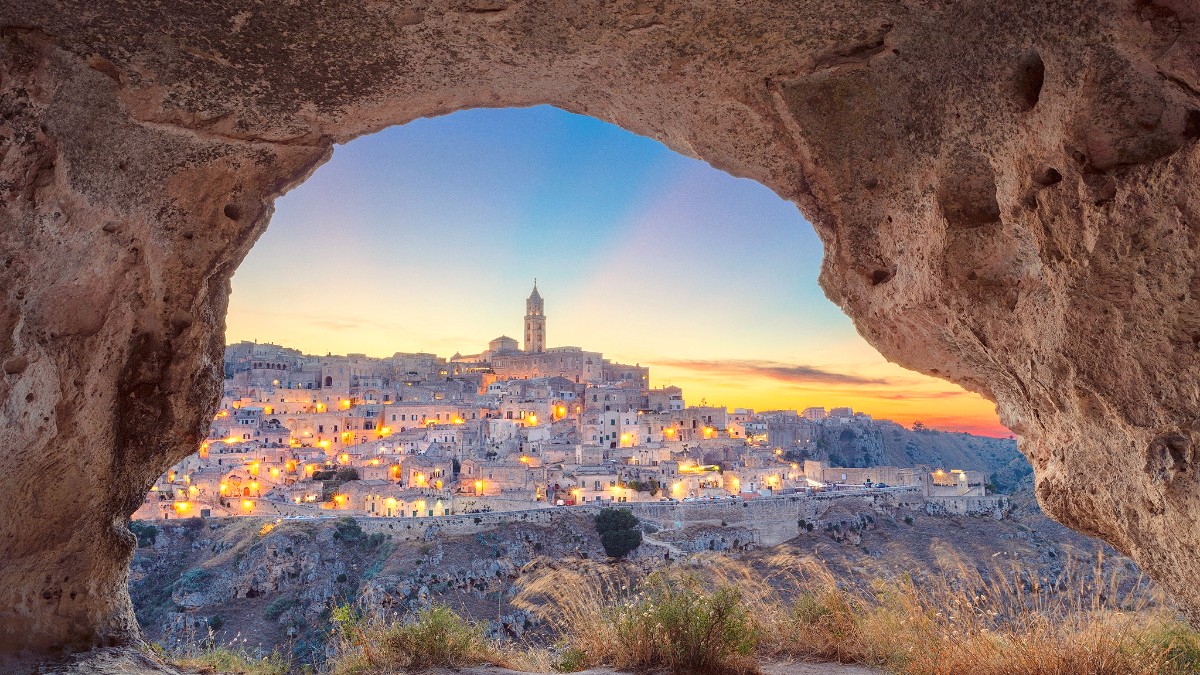
Basilicata, Italy
Spring (April-May) and Autumn (September-October) have temperatures typically ranging from 15-28°C (59-82°F). Matera sees moderate rainfall during spring, though sunny days prevail. Autumn generally has less rain. These seasons offer pleasant weather for extensive walking and outdoor exploration. The landscape around Matera begins to bloom in spring, and autumn light takes on a golden quality, excellent for photography.
Summer (June-August) has hot and dry conditions, with temperatures often reaching 28-35°C (82-95°F) and sometimes more. Precipitation is minimal. Humidity can be high. Long daylight hours offer more time for sightseeing, but direct sun exposure during midday can be harsh. Winter (November-March) has cold temperatures, typically 5-15°C (41-59°F), and can drop below freezing, especially at night. Matera experiences occasional rain or even snow, which transforms the Sassi into a magical, quiet landscape.
Summers in Matera include intense heat. Prioritize early morning or late evening activities. Seek shade during midday, and stay hydrated by drinking plenty of water. Carry a Reusable water bottle and refill it often.
Winters include cold temperatures. Warm, layered clothing is important, especially if you explore the Sassi, which feels colder in its narrow, shaded passages. A waterproof outer layer is a good idea for rain or snow.
April-June, Sept-Oct
Pleasant temperatures, all services open, good for photography.
Higher demand for accommodation, can feel crowded.
March, November
Lower prices, fewer tourists, relaxed exploration.
Chilly days, higher chance of rain, limited hours for some businesses.
Dec-Feb, July-Aug
Fewest crowds, lowest prices, ethereal snow-covered Sassi (winter).
Very hot (summer) or cold/rainy (winter), limited outdoor activities.
Italy operates within the Schengen Area. Citizens outside the EU/EEA/Switzerland generally need a Schengen visa for stays over 90 days within any 180-day period. Obtain this visa from the Italian embassy or consulate in your home country before your trip. The application process includes various documents and takes time.
Many nationalities, including citizens of the United States, Canada, Australia, New Zealand, the United Kingdom, and numerous South American countries, do not need a visa for tourist or business stays up to 90 days. Beginning in 2025, visa-exempt non-EU nationals will need to apply for an ETIAS travel authorization before entering the Schengen Area. This is a pre-travel authorization, apply for ETIAS online prior to your departure. Watch for official announcements regarding its implementation date.
Valid for three months beyond departure, issued within 10 years.
Proof of your intention to leave the Schengen Area.
Demonstrate enough money for your stay (bank statements, credit card limits).
Copies of hotel or other accommodation bookings for your entire stay.
Recommended for all travelers, required for Schengen visa applicants. Consider IVisa or VisaHQ for visa needs. For insurance, explore World Nomads, SafetyWing, or Insubuy.
Understand currency, exchange options, and typical costs for your Matera trip.
Italy uses the Euro (€, EUR). ATMs, known as "Bancomat," are widely available throughout Matera's modern city (Piano) and some locations within the Sassi. Most hotels, restaurants, and larger shops accept major credit cards (Visa, MasterCard).
Costs vary based on travel preferences. Here is a general daily average:
These averages give an idea of typical costs:
Matera is a safe city. Consider common health and safety measures for a smooth trip.
No specific vaccinations are required for entry to Italy. Keep routine vaccinations up-to-date. Consult your doctor for personalized recommendations.
Apply high-SPF Sunscreen regularly, wear a Wide-brimmed hat, and drink plenty of water. Carry oral rehydration salts if prone to dehydration.
Stick to reputable establishments, wash your hands regularly, and consider bringing Anti-diarrhea medication.
Emergency Number: Dial 112 for the general European Emergency Number (police, ambulance, fire). For medical emergencies, you can also dial 118.
Matera has a public hospital, Ospedale Madonna delle Grazie. Pharmacies ("Farmacia," green cross sign) are widely available in Matera's modern city. Pharmacists offer advice for minor ailments and over-the-counter medications.
If you are an EU/EEA/Swiss citizen, carry your European Health Insurance Card (EHIC). Non-EU citizens should purchase comprehensive travel insurance covering medical emergencies and evacuation. Tap water is generally safe to drink.
Companies like World Nomads or SafetyWing are good options for travel insurance. Also consider AirHelp for flight compensation assistance.
Matera is a remarkably safe city with low crime rates, especially violent crime. It offers a relaxed atmosphere for visitors.
The Sassi can be dimly lit and confusing at night. Stick to well-trafficked, illuminated paths. Carry a Small flashlight for darker alleys.
Basilicata is a seismic zone. Minor tremors can occur. Summers bring heatwaves. Flash floods are rare but possible during heavy downpours in low-lying Sassi areas. Pay attention to local weather warnings.
Keep a list of these numbers readily accessible:
Travel insurance is highly recommended for all travelers to Matera and Italy. Purchase a policy that includes:
Hospitalization and emergency medical evacuation.
For unforeseen events that prevent or cut short your trip.
For luggage loss or delay, and personal liability for accidental damage.